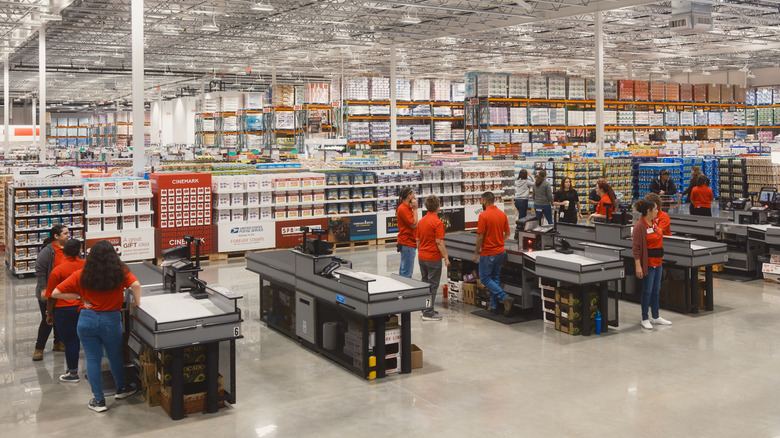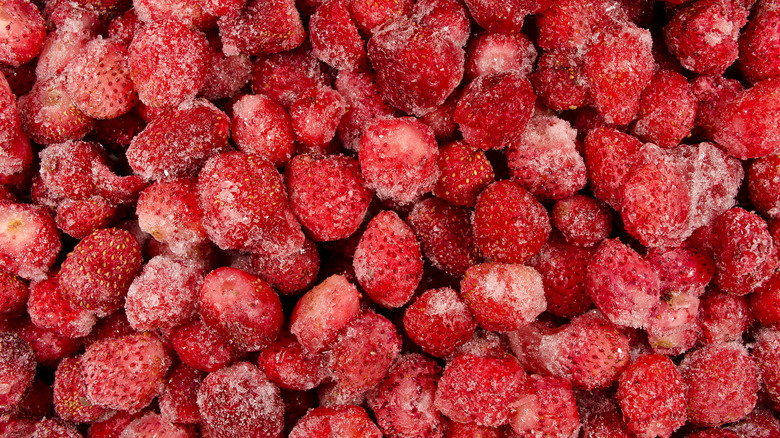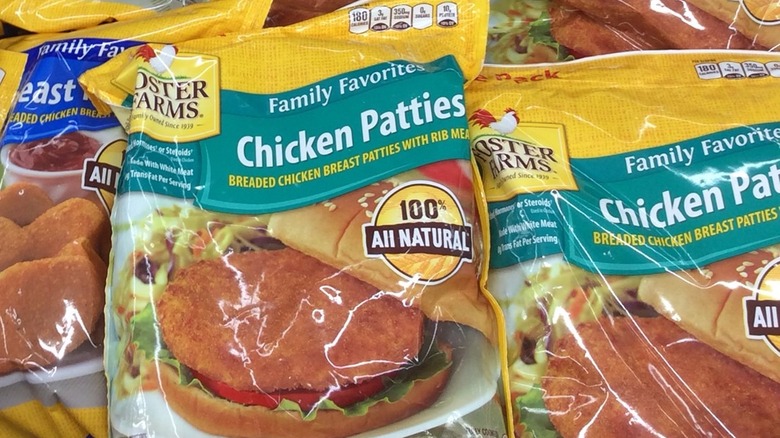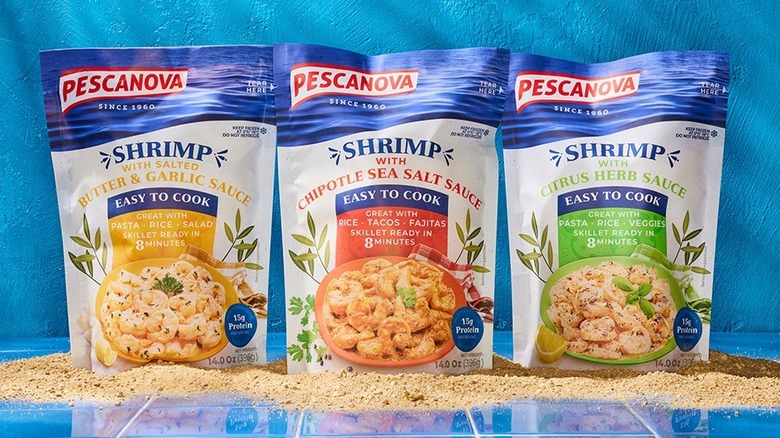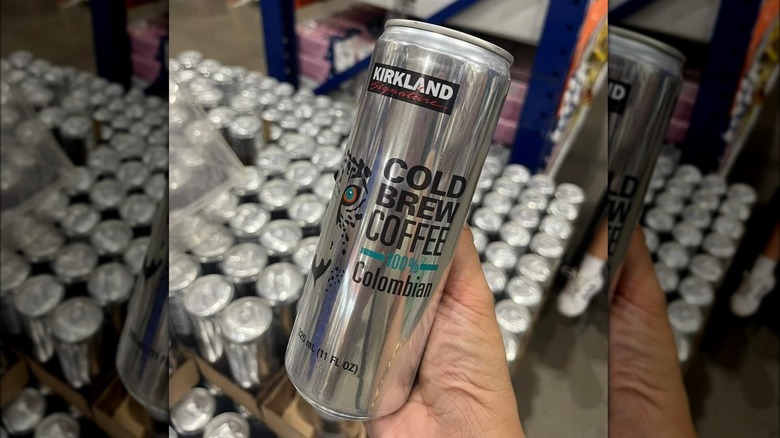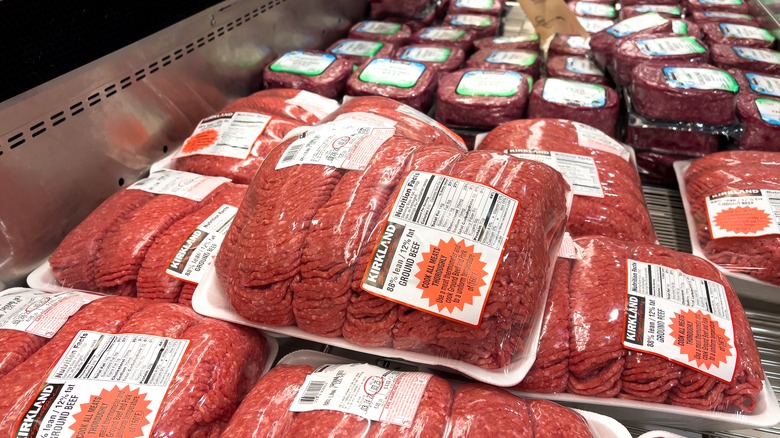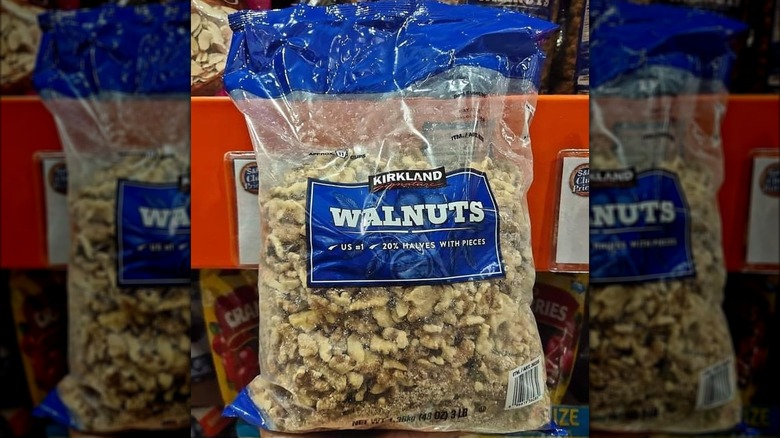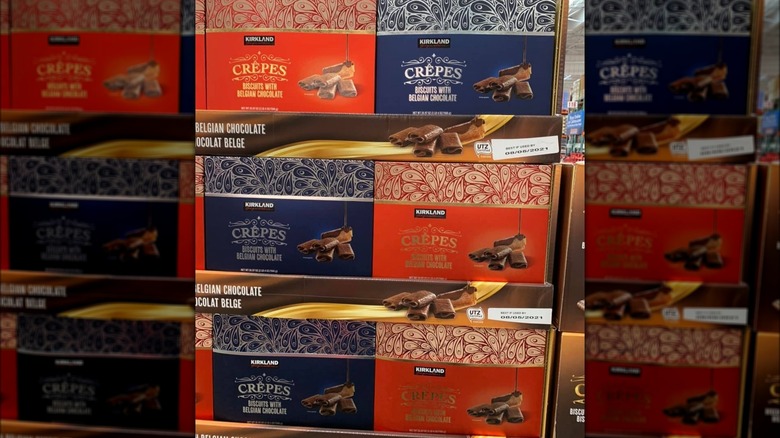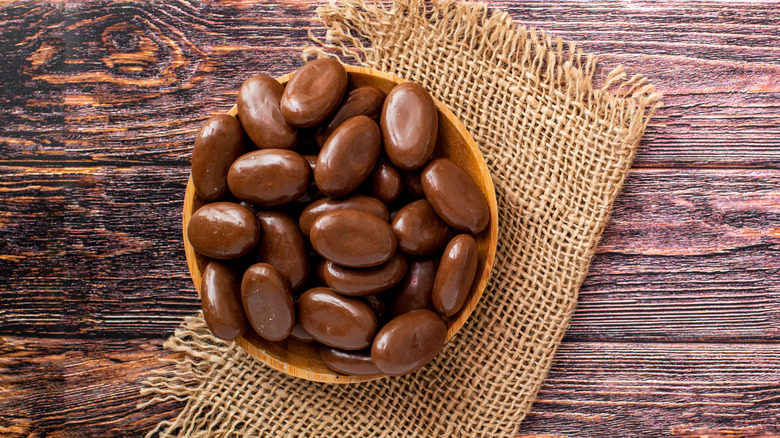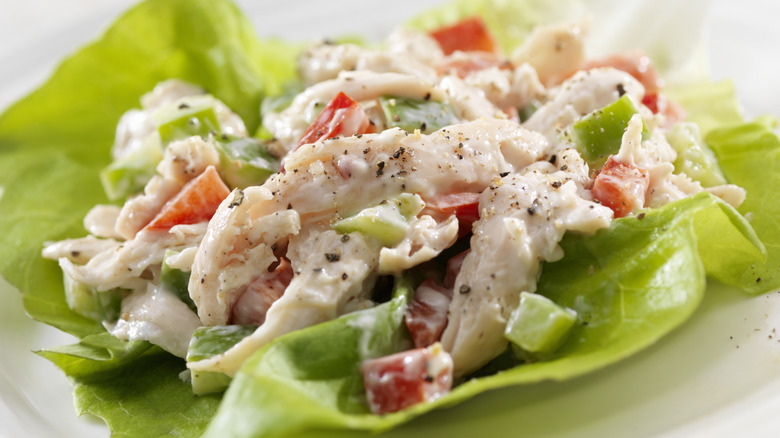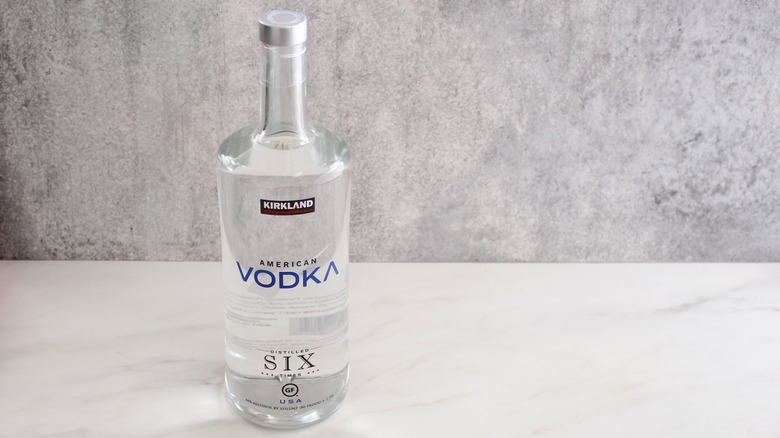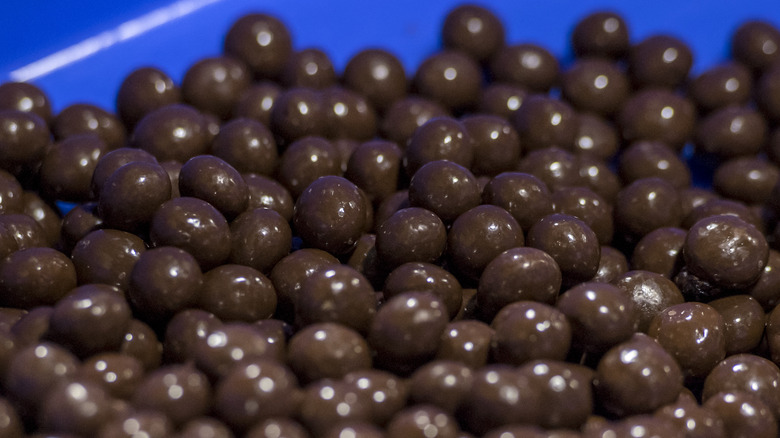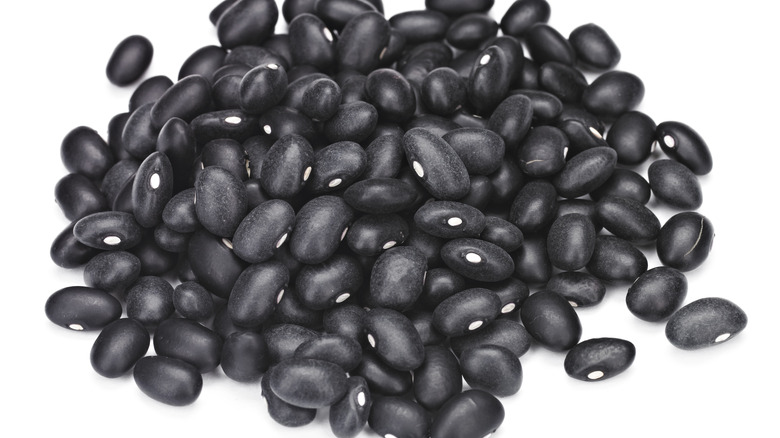Biggest Food Recalls In Costco History
Costco is listed among the top retail stores in the world, with nearly 119 million cardholders (via Statista). A significant number of people buy — and subsequently, eat — the food stocked on the warehouse shelves. Having such a large number of consumers means that the company must constantly remain vigilant with regard to food safety, consistently ensuring that edible favorites such as its famous muffins, savory rotisserie chickens, frozen entrees, large egg containers, or cartons of milk in the cold room, are untainted and safe for consumption at all times.
That being said, with a food product base and collection of suppliers as vast and varied as Costco's, accidents are bound to happen. Although mishaps don't usually affect all locations, the effects can still be great. From food poisoning scares to foreign materials present in packaging or products that simply taste off, here are some of the biggest food recalls in Costco's history.
Kirkland Signature organic strawberries
Many consumers look forward to a morning smoothie blended with berries from one of Kirkland's 4-pound bags of organic strawberries, but in March 2023, customers at various Costco locations were cut off from their favorite product. As part of a current and ongoing nationwide hepatitis A outbreak linked to strawberries, the giant bags of frozen fruit were pulled from Costco's shelves. Nine people became sick, and concerns about potentially spreading the contagious liver disease prompted the product's removal.
Though the recall on the Kirkland berries has been retracted and consumers can go back to enjoying newly purchased bags as normal, other frozen fruit products have been flagged in the outbreak and are not yet considered to be in the clear. Willamette Valley Fruit Co.'s Rader Farms organic fresh start smoothie blend and Wawona's Organic Daybreak blend — both of which are also sold at Costco, as well as other retail stores — contain potentially infected strawberries.
The affected lots were obviously pulled from the shelves, but there is lasting concern that there may still be contaminated bags lingering in the freezers of unaware consumers. If you've got any of these products stowed away at home, it might be a good idea to pull them out of the depths of the ice box and check them against the affected lot codes, just to be safe.
Foster Farms breaded chicken patties
Foster Farms, known for its free-range, ranch-raised chickens and turkeys, has frozen poultry products sprinkled in stores all across the U.S. One of those is Costco Wholesale, which sells a resealable 5-pound bag of the company's chicken breast patties with rib meat in its freezer section. Perfect for busy weeknight dinners, this bulk bag of 20 delicious-tasting patties is a staple for many chicken-loving American households.
But in 2022, the public was told to discard its recently-purchased bags of Foster Farms chicken patties ... talk about food waste. The reason? Pieces of hard, sharp plastic shards were potentially mixed into the patties. The recall was assigned as a Class I, meaning the risk of injury — or even death — was considered medium to high for consumers if a plastic shard was accidentally swallowed. Thankfully, the revocation was executed quickly and responsibly, people were refunded for their troubles, and no injuries were reported.
Pescanova shrimp street tacos
Who doesn't love a good shrimp taco? The combination of seafood and Southwestern flavors is so popular that it has been turned into a convenient frozen taco pack by Pescanova that is up for grabs at Costco Wholesale. "Quick to prepare in a skillet and really good," commented a user on Reddit, above a shot featuring a ready-to-go bag full of veggies and shrimp, with a roasted corn, poblano, and chipotle sauce — packed with 11 grams of protein no less.
But those who purchased their favorite frozen taco mix between the months of March and April of 2023 found themselves headed back to the warehouse for a refund instead of whipping up the tasty meal on the stove. Slews of bags of Pescanova shrimp street taco bags were recently recalled due to extraneous (and hazardous) material in the contents. More specifically, plastic pieces reportedly estimated as being up to 5 millimeters in length could possibly be found in the bags. This would certainly not be a welcome addition to your family taco night, and more grimly, it would surely be a dangerous one. So if you're doing a freezer raid and come across a bag purchased between the dates of March 23 and April 24 of 2023, it's probably best to develop a new dinner plan.
Kirkland Signature Colombian cold brew coffee
Costco's Kirkland brand entered into the realm of ready-to-drink coffee with its Colombian cold brew. Sold in a 12-pack of 11-ounce aluminum cans, the product is ready to be placed in the fridge and popped open on the days you feel you need a quick burst of energy. In addition to Costco shelves, you can also find the cans of cold brew on Amazon, or in the aisles of other retailers such as Target or Walmart.
But recently, a foreign object scare caused the popular chilled coffee drink to fall into recall territory. The affected cans totaled a staggering 2.7 million and included those sold between November 5, 2022, and February 10, 2023. The concern? Apparently, there was a chance that a metal bolt might have found its way inside some of the cans.
According to Costco's Frequently Asked Questions regarding the recall, only three drinks out of the few million that were potentially affected were believed to actually contain the bolts. Chances are high that you would hear it clanging inside the can or feel it in your mouth before swallowing — if you were to take a sip. Many Redditors in the r/Costco subreddit commented that they would just continue pouring the cold brew into a glass before consuming it instead of throwing it out or going through the hassle of returning the unopened products. To each their own.
Kirkland Signature ground sirloin and loin of beef patties
Ideally, infected foods are detected and pulled off the shelves before anyone gets sick ... but unfortunately, this isn't always the case. Sometimes, it takes a person falling ill to find the fault. Back in 1998, a woman in New York became infected and ultimately hospitalized with E. coli bacteria after a family cookout. The cause was quickly linked to the Kirkland beef burgers that had been prepared for the meal.
This occurrence forced Costco to rapidly hop on its emergency line, recalling a whopping 172,000 pounds of frozen beef across 24 different states. However, multiple spokespeople — including those from Costco, the U.S. Department of Agriculture (USDA), the National Meat Association, and the American Meat Institute — commented on the incident, saying that even if E. coli is present in a piece of meat, it can always be killed if it is cooked to proper temperatures. For ground beef, the recommended temperature is 160 degrees Fahrenheit (via USDA). As an extra precautionary measure against any potential bacteria lingering within, be sure to always use a meat thermometer before consuming your hot off-the-grill burgers, just to be safe.
Kirkland shelled walnuts
Sometimes, even foods with an extended shelf life simply go bad. This was the case in 2022 with plenty of Kirkland Signature shelled walnuts. The extra large 3-pound bags of halved and shelled nuts are perfect for dedicated bakers (and dedicated snackers, of course). They are normally a delicious, healthy, and great-tasting addition to anyone's diet. But people who purchased this staple in the months of September and October of that year were in for a nasty letdown when they excitedly ripped open the bags with the intent of munching.
"We are recalling the Kirkland Signature shelled walnuts due to the stale taste and rancid smell," the official notice read. Yikes. While not an issue likely to cause bodily harm, the idea of serving a tray of rotten candied walnuts to your loved ones at your next family dinner isn't great. Nor would it be ideal for bakers who accidentally use the rancid nuts in a baked good. Such a mistake could have detrimental results for a small business relying on quality ingredients, so we commend Costco for offering a full refund in this case.
Ellenos vanilla bean Greek yogurt
There's a good reason companies and brands are required to disclose allergens in their products. For people with food allergies, ingredients such as dairy, peanuts, or shellfish, can cause reactions like abdominal upset, skin rashes ... and in extreme cases, even death. Consumers with allergies need to know exactly what they are putting into their bodies — which is why an omission of an allergen on a food label is a serious problem. Unfortunately, one such oversight occurred with a popular Costco product.
Ellenos vanilla bean Greek yogurt, sold in 4-ounce containers in packs of 12, was recalled in May of 2023. People were prying off the tops only to find they were filled with a yellow-tinged yogurt, as opposed to the standard white-with-black-speckled color the cups were meant to have. It was quickly determined that a packaging malfunction had occurred, and the company's lemon curd yogurt had accidentally been placed into the cups labeled vanilla bean.
The danger? The lemon curd yogurt contains egg, whereas the vanilla bean does not. Therefore, the labels on the vanilla cups did not list eggs among the ingredients. Thankfully — and somewhat miraculously — no one appears to have been harmed over the potentially deadly mix-up, thanks to the quick-acting steps of Ellenos, the Food and Drug Administration, and Costco, to get the product off shelves as fast as possible.
Kirkland Signature chocolate crêpes
While most food recalls happen for public health or safety concerns, there are others that occur for, well ... reasons that are a bit bizarre in the eyes of many. Such was the case for the large voluntary recall of Kirkland's Signature chocolate crêpes in March 2023.
The layered chocolate-covered biscuits are beloved by many consumers, so when emails with a heading reading "recall" began flooding into shoppers' inboxes, there was initial panic. However, when the reason was revealed, consumers found themselves scratching their heads more than shaking in fear. "It has come to our attention that some crepes may be discolored," reads the Important Product Information on Costco's website. "This is not a health or food safety issue."
Meanwhile, users on Reddit seemed universally unconcerned. "I buy these every year and the color starts to turn a little white but is still safe to consume," wrote one user in a r/Costco thread. "It's called fat bloom that usually causes the coco to turn a little white. Just eat them faster if you don't like the color change lol." Another user joked about receiving the email and commented that the "only warning I will ever need for those crepes is how quickly I'll eat them." How necessary this particular recall was, we aren't sure, but it was no doubt nice for people who found themselves turned off by the discolored crepes to have the option of a refund.
Redland's dark chocolate covered pistachios
Companies generally like to put out their best work, and we can't say we blame them. After all, success as a brand depends on how well consumers like your products. So if something that is simply not up to par is put out with your name on it, it makes sense that you would want to recall it as soon as possible and get the good stuff into the hands of consumers instead.
While not a public safety issue, Redland's dark chocolate-covered pistachios were recalled for this very reason back in 2021. The sweet and savory pistachios sold between the months of May and June of that year had been over-roasted, the company insisted. "This does not meet our quality expectations," the statement from Redland Farms read. But despite the grand-scale removal of chocolate nuts from shelves, the worst one could expect from having purchased an affected container was a bit of a burned and smoky aftertaste. Who knows? Some might even prefer their chocolatey, nutty nibbles this way.
Costco rotisserie chicken salad
In 2015, there was a widespread outbreak of E. coli that caused 19 people spread across seven states to become ill — five of which required hospitalization to recover. Backtracking linked the strain to Costco's rotisserie chicken salads, and after further investigation, the celery and diced onions were pinpointed as the culprits. Supplied by Taylor Farms, 154,000 packs of Pacific celery and onion diced blend were recalled.
Costco was not the only retail store affected by the pullback, either. Since Taylor Farms was the supplier for many different grocery stores that add vegetables to products and recipes such as packaged dinners, sides, and salads, places like Walmart, Sam's Club, Starbucks, Target, and others were also forced to recall a number of their edible products. Although it was a major inconvenience for many, considering that E. coli can be a life-threatening bacteria (especially for the very young and the very old), the abundance of caution was absolutely necessary in this case.
Kirkland Signature American vodka
Since alcohol is naturally shielded from bacteria strains found in meats or infected vegetables, this next one comes as a bit of a surprise. A recall on liquor? Yes, it's true. In 2023, Costco yanked cases of its Signature American Vodka from warehouse shelves on the basis of an apparent disgusting taste and smell coming from the bottles.
Customers consistently noticed that something was off with the handles, too. "What is going on with the Kirkland brand of Vodka?" reads the title of a recent Reddit thread under r/Costco. One extremely helpful reply came from an employee at Costco's regional office. Alongside a list of affected batch numbers, they explained the reason for the strange taste. "[...] it has hints of rum due to a container not being completely clean before it was used for vodka during transport." The employee asserted that while there are no health risks related to the recall, the alcohol doesn't taste quite right as a result. Based on the feedback of consumers across the internet, the cross-contamination made the vodka hardly drinkable — so most felt it more than worth the trip back to the warehouse to replace it with a new handle before happy hour.
Torn Ranch organic dark chocolate blueberries
Tree nut allergies affect around 0.5 to 1% of the country's population, according to the American Academy of Allergy Asthma & Immunology. Though that may not sound like a huge percentage, allergies to almonds, cashews, pistachios, and walnuts, among others, are considered among the more common food allergies, and reactions can be extreme to the point of life-threatening. That's why the 2021 recall of Torn Ranch organic dark chocolate blueberries — a product that was not supposed to contain tree nuts — was so important.
The potential, accidental presence of almonds in the delicious dark chocolate blueberries, which are sold at Costco in 18-ounce bags, was cause for an immediate recall. The allergen was undeclared, and while finding a nut or two in a bag of chocolate berries would not be a big deal for the average consumer, for people with an allergy it could have deadly consequences. Luckily, the affected bags had only been distributed to warehouse locations in four states — Washington, Oregon, Idaho, and Alaska — and a quick response from both Torn Ranch and Costco potentially saved lives.
Canned S&W organic black beans
Botulism — a potentially deadly sickness caused by a toxin brewed from bacteria that attacks the nerves — is admittedly rare but still a risk when it comes to low-acid canned foods such as beets, corn, potatoes, or beans. The proper packaging and sealing of metal cans is extremely important in order to prevent the growth of this toxin. So in 2021, when doubts plagued the company Faribault Foods, Inc. regarding potential improper steps taken during the sealing process, a recall was immediately issued.
The huge voluntary recall included three different types of beans (two variants of organic black beans and one chili bean product) sold at Costco as well as other large retailers between February and April of that year. Customers were invited to bring any cans listed in the affected lots back to the store for a full refund or a replacement with a healthy can of beans, so that they could still make their favorite black bean recipes.
